Sandra Whitehead, Wisconsin Muslim Journal, Oct 31, 2023
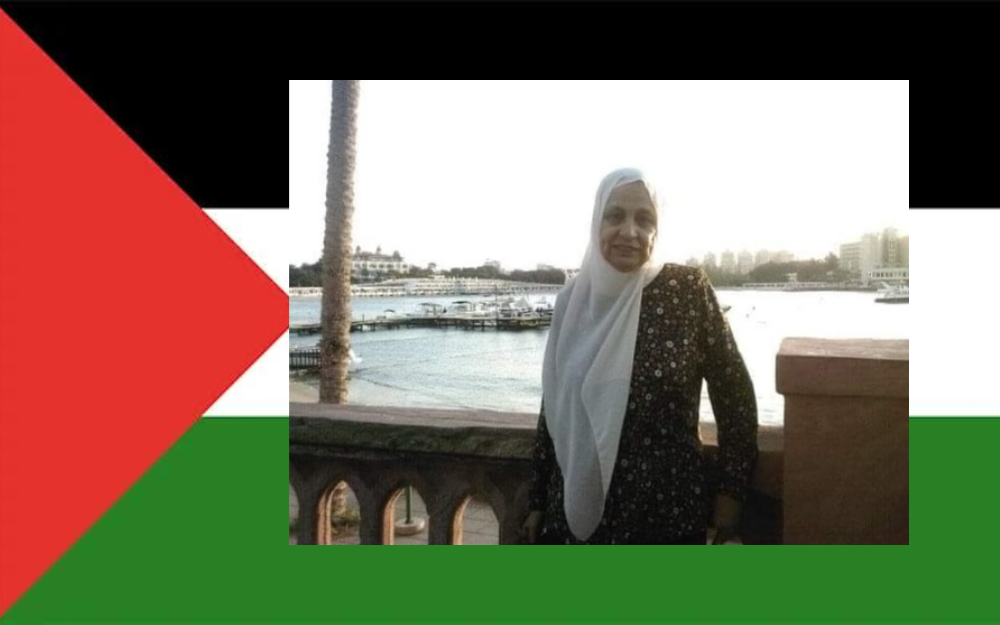
Franklin residents Esam Sakalla and Rola Sakalla-Saleh have always thought of their Aunt Nadia as their second mom. Rola last visited with her in Alexandria, Egypt, years ago.
Three Franklin families closely follow a chat on social media that connects members of the Sakalla family scattered from Kuwait to Wisconsin and beyond. Since an Israeli blockade that began in 2007 made it almost impossible to visit Gaza, social media chats have been the main tie to their relatives there.
Messages this month are short.
Israeli Prime Minister Benjamin Netanyahu declared war Oct. 8, following Hama’s massive military operation into Israeli territory that killed about 1,400 Israelis and resulted in 212 Israelis and foreign nationals being held captive by Hamas. Israel launched airstrikes that flattened neighborhoods in Gaza and caused the deaths of 8,000 Palestinians to date, including 3,195 children, according to Gaza’s Ministry of Health and reported by Save The Children.
On Oct. 9, the Israeli government announced a complete siege on Gaza, blocking water, food, medicine and fuel from entering the 25-mile strip where about 2.3 million people live, almost half of them children.
“’Are you still alive?’ That’s all we ask,” said Rola Sakalla-Saleh during an interview with Wisconsin Muslim Journal in her Franklin home. “I don’t have the guts to ask, ‘Are you able to feed your kids?’ or ‘Are you able to find water?’”
Sitting beside Rola on the couch, her daughter, a computer science student at the University of Wisconsin-Milwaukee, gently stroked her arm in difficult moments of the Sunday-afternoon interview. Rola’s younger brother Esam Sakalla, who lives nearby, sat on an adjacent couch, across from a WMJ reporter. Rola, Esam and their youngest brother, Hussam, have lived in the Greater Milwaukee area since the early 2000s.
More
The brother and sister recalled 15 distressing days as they followed their family’s fearful track from their home in Rimal, an upscale neighborhood in the heart of Gaza City, to Khan Younis in the south, where they met their horrible end.
A close-knit family in Rimal
Rola recalled visiting the Sakalla family home in Rimal with her mother. Rola, Esam and Hussam grew up in Kuwait. Though weary and sad, she brightened at the memory.
“I only visited Gaza once. I was in elementary school. I still remember the smell of jasmine. At night, when the breeze came, the sweet smell was everywhere.
“I remember the family sitting and eating together. The house had only one level then.” When someone got married, they built another level for the new family. That’s how we did it—another wedding meant another level. When my cousins got married, we built another level for them to live in. Eventually there were three levels. It was a family house.
“I don’t know if people in the United States can understand the closeness between family members we have, especially in Gaza,” she said. “To be honest, it is way different overseas than here.
“Here maybe you occasionally visit your first cousin but we over there we are constantly visiting first, second and even third cousins. An aunt is like a mother; an uncle like a father. The ties are way stronger. I don’t think we can replicate that here.
“And in Gaza, it’s even more because of the way they have to cope with everything.”
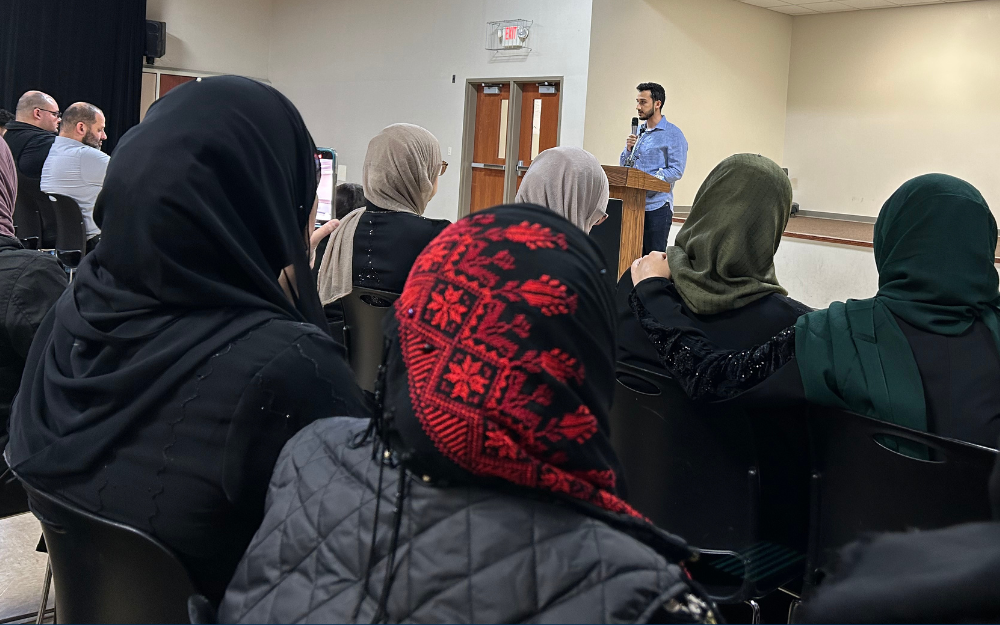
Omar Saleh, the son of Rola Sakalla-Saleh, spoke about his family’s devasting loss of at least 50 family members on the Oct. 24 Israeli bombing of Khan Younis in south Gaza.
Rola, her husband and children visited the West Bank last year. She longed to see her family in Gaza but it was too difficult, if not impossible, to get permission to enter, she said.
While in the West Bank, she looked for a slushy she remembered having in Gaza, where a man rode around selling the treat to children. She didn’t find it. “You can’t find it anywhere else,” she said.
Like her family home in Rimal, the slushy is something she remembers experiencing with her mother who had died of cancer when Rola was 18, Esam was 14, and Hussam was 9.
“Everything I remember from that time with my mom, everything related to Gaza because I know how much she loved it, is a connection to my mother who I lost at an early age,” Rola said.
Our second mom
The strongest connection to their mother has been Aunt Nadia, their mother’s sister,” Rola and Esam agreed.
“Aunt Nadia looked just like her,” Esam said, “but maybe a little bit thinner.”
“Our mother loved her a lot,” Rola added. “She really loved her. She would talk about her all the time.”
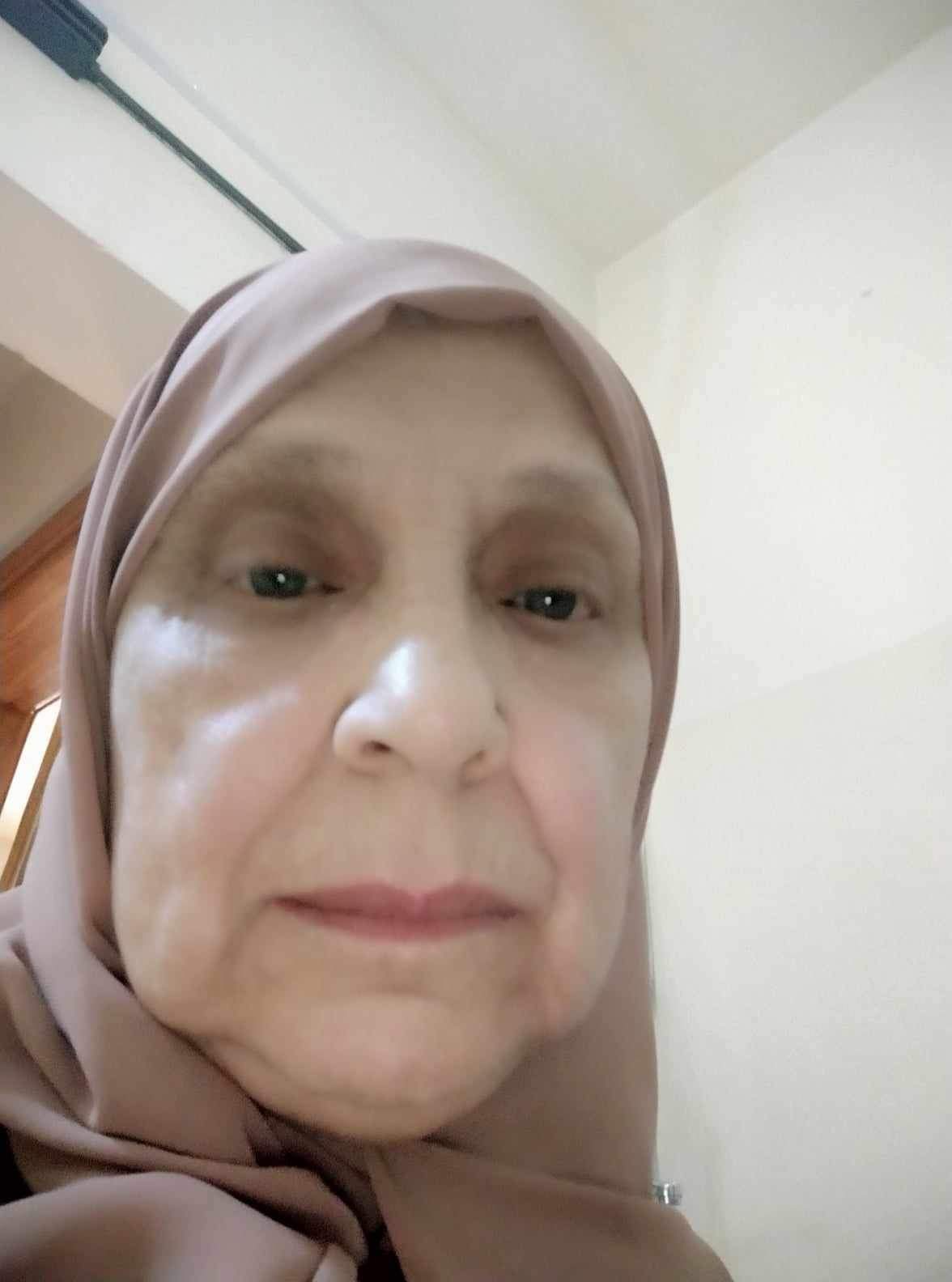
Aunt Nadia, a second mother to three siblings in Franklin, sent a photo of herself to them with the message “This may be the last picture you see of me.”
They described her as positive and loving. “One of her neighbors called her ‘the neighbor of joy,’” Rola said.
“I have three kids—a boy and a girl, twins who are 9, and a 12-year-old son,” Esam said. “I have always talked to them about my Aunt Nadia, calling her ‘your grandmother.’ They didn’t have a chance to meet my mom who died in 1994. They saw my father, but he passed away when the twins were less than a year old.
“Since they were babies, I told them one day we might see Grandmother, meaning Aunt Nadia.”
“She’s the only grandmother we have known,” Rola’s daughter said.
Aunt Nadia never married. She and their mother had another sister, who died young in a car accident, leaving two young children behind. Nadia raised them as her own.
“She dedicated her life to raising those kids and taking care of her mom and dad,” Esam said. “It was one of those kids, now in his 30s, who had to identify her body.”
Years ago, Rola met Aunt Nadia in Egypt. “Back then, it was possible for her to visit Egypt,” before travel for Gazans became more restricted, she said. “She loved the beach at Alexandria.” Since then, all their conversations have been over social media.
“Whenever we asked her how she was, no matter all the difficulties she faced, she always said, ‘We’re living, Al hamdulilah,’” an Arabic expression meaning, “all praise to God.”
Aunt Nadia didn’t complain or expand on her hardships “beyond answering our questions,” Rola said. “She was always trying to enjoy her life.
“Now that I understand more about all they were going through, all they’re facing—what’s a good word for it?” Rola struggled to describe it.
“Genocide,” Her daughter suggested.
“It’s more than that,” Esam said. “It’s terror. I imagine it this way, I’m sitting in a house, hear planes overhead and I’m just waiting to die.”
Fleeing to their death
The warning came Monday, Oct. 9, to the Rimal neighborhood, an area with upper-class apartment towers, shopping malls, restaurants and offices belonging to international media and aid groups. Residents were to leave the area immediately, Rola said.
Immediate family and relatives filled the Sakalla’s three-story home. The Rimal neighborhood had been considered a relatively safe place until the warning came. The warnings told them to go south where they would be safe.
They complied immediately, Esam said. Before heading to the south, Nadia took a photo of herself and sent it to the family in a message. “This may be the last picture you see of me,” she wrote.
Everyone left together and set out for Khan Younis, an area in the south where they had other relatives with a large family home.
“What they all want to do is to stick together. They don’t want some of them to die and the others to suffer,” Esam said.
“The family had barely left when they bombed the area,” Rola said. A cousin took photos of the home, roofs and walls blown out by the blast. The magnitude of the devastation in Rimal left Gazans feeling nowhere was safe, The Guardian reported.
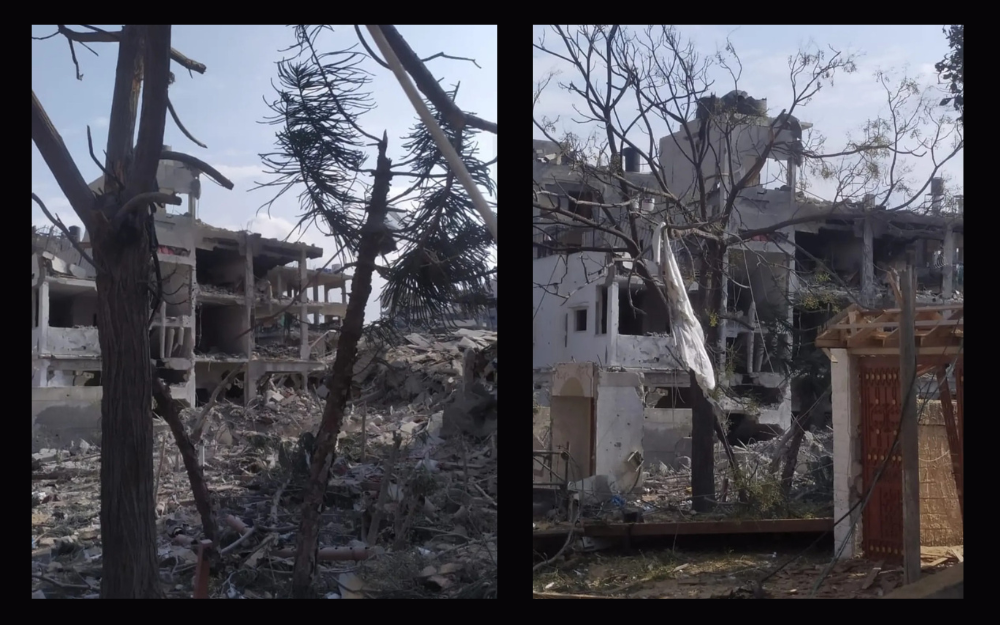
The Sakalla family home in the Rimal neighborhood in Gaza City was destroyed Oct. 9 by an Israeli airstrike.
Rola recalled their online chat the next day.
Are you okay? Where are you?
Khan Younis.
Yes, al hamdulilah. I miss you all. I can’t wait till I see you.
“Our sister in Qatar replies back, saying, “I miss you, too, Auntie,” Rola said. “Then Aunt Nadia says, ‘I miss my house.”
“I can feel her pain without her saying more,” Rola said. “I understood what a difficult time she is going through. She left with nothing. I’m 100% sure because they had to leave right away.
“In my mind, I’m thinking, when this ends, we are going to help her,” Rola said. The Sakalla relatives outside of Gaza began talking among themselves, making plans about how they could help Aunt Nadia rebuild her house and make her feel better.
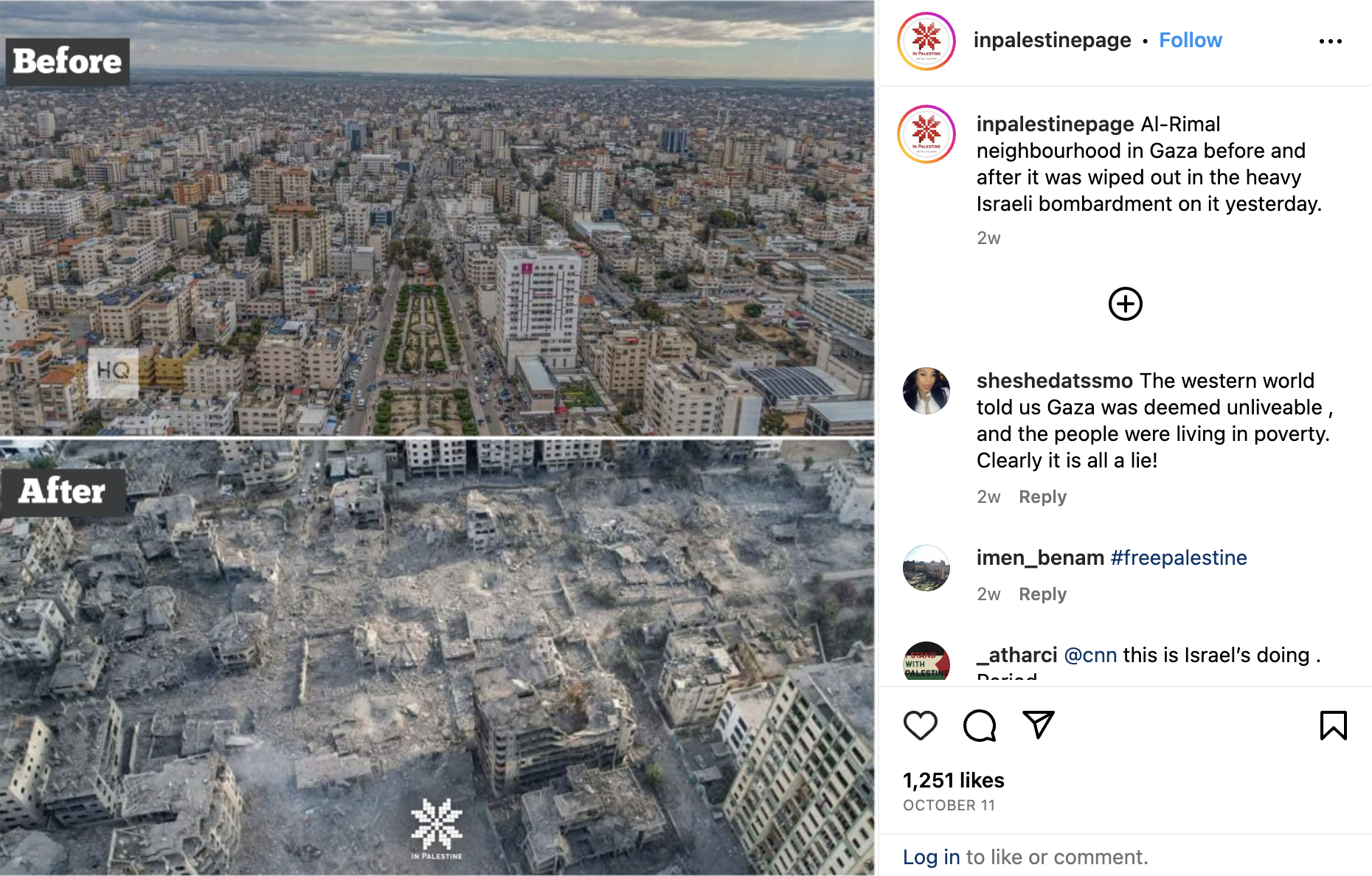
Then the news came about Sakalla home in Khan Younis. A missile went straight down the middle of the four-story building at dawn on Oct. 24, directly into the family room where Aunt Nadia was praying.
Esam and Rola estimate at least 50 people from the Sakalla family were killed in that one airstrike. Bodies have been difficult to identify, as many have been torn apart.
Aunt Nadia “is in a better place,” Rola said thoughtfully. “She’s in a place where she can find safety and water. She’s in a beautiful house, scented with jasmine.
“That’s what makes it possible for us to move forward.”
Leave a Reply
You must be logged in to post a comment.